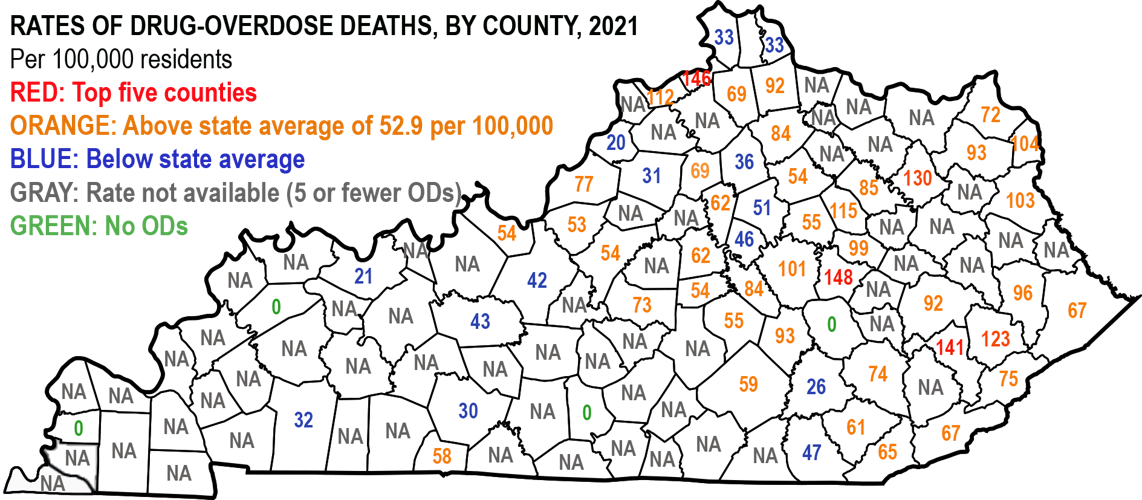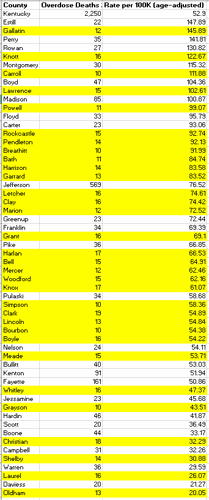According to the state's annual report

Drug-overdose deaths in Kentucky rose 14.6 percent in Kentucky in 2021, according to the state's annual report released Monday.
“The drug epidemic is not a Kentucky issue or political issue, but a nationwide issue that is affecting everyone and every state,” Van Ingram, executive director of the state Office of Drug Control Policy, said in a news release. “Our focus over this next year will be on increasing access to clinical care for those suffering from an addiction and offering more harm reduction measures.”
The state recorded 2,250 overdose deaths in 2021. That was 286 more OD deaths than the 1,964 reported in 2020, when the increase from the previous year was 54%.
The Covid-19 pandemic hit in 2020, disrupting lives and drug treatment, so it got most of the blame for that year's big increase. But the powerful opioid fentanyl was also becoming more prevalent, creating a "perfect storm" that is still being felt, Ingram said on KET's "Kentucky Tonight" Monday night. He told The Associated Press, “We’ve never seen one drug this prevalent in the toxicology reports of overdose fatalities.”
Estill County had the highest rate of fatal overdoses in 2021, 148 per 100,000 residents (adjusted for age of the population). It was followed by Gallatin, 146; Perry, 142; Rowan, 131; and Knott, 123. The report cautions that counties with fewer than 20 OD deaths per year, as was the case in all but Estill, Perry and Rowan, are unstable and should be interpreted with caution.
The report does not give rates for counties with fewer than 10 overdose deaths, nor the actual number of OD deaths in counties with 5 or fewer. The number of counties with 10 or more OD deaths rose to 57 in 2021 from 44 in 2020.
Jefferson County, the state's most populous, again had the most resident overdose deaths of any county, 569. That was an increase of 11% from the 512 recorded in 2020. The county's OD-death rate was 77 per 100,000, well above the statewide rate of 52.9 per 100,000.
Toxicology reports show that fentanyl was involved in 1,639 of the overdose deaths, or about 73% of them. That was an increase of 16% from the 1,413 overdose deaths involving fentanyl in 2020.
Methamphetamine was found in 1,075 of the overdose victims, or about 48%. This is an increase of 33% from the 809 OD deaths involving methamphetamine in 2020.
Heroin was involved in 93 of the 2021 overdose deaths, a decrease from 191 in 2020. Also seeing decreases from the prior year were morphine, detected in 309 cases; acetyl fentanyl (256); and alprazolam (211), among others.
Oxycodone saw a slight decrease from the prior year, having been identified in 198 drug overdose deaths in 2021, down from 201 cases in 2020.
Some of the drugs that saw increases from the prior year's toxicology reports were amphetamines, in 945 cases; gabapentin (503); THC (476); cocaine (300); hydrocodone (199); tramadol (129) and diazepam (85).
The age group in which Kentucky overdose deaths are most common continues to be 35 to 44. Next is 45-54, which ranked third in the 2020 report and traded places with the 25-34 range in this year's report. Ranking fourth were the 55-64-year-olds.
Over many years, Kentucky has supported programs, legislation and research to battle substance-use disorder, along with funding support.
"This problem is like a bucket with fifty holes in it," state Sen. Ralph Alvarado, R-Winchester and a physician, said on "Kentucky Tonight," adding that it's a problem that must be addressed by all elements of society, not just government.
But progress has been made, with measures such as harm-reduction programs that include syringe exchanges, House Minority Leader Joni Jenkins of Shively said: "We can't even quantify how many lives we've saved."
The state has more syringe exchanges than any other. "We may be ground zero for this problem, but son, a recovering addict who is CEO of Addiction Recovery Care, a chain of treatment centers that try to lead drug users to careers. He said addiction often seems "daunting and hopeless" because it usually take several attempts to kick the habit, "but recovery's possible. I see it every day."
Robinson said so much treatment is available in Kentucky now that "It's almost treatment on demand," but the state needs more mental-health professionals. He said methamphetamine use is harder to treat because there is no medication-assisted treatment for it, as there is for opioid use, and it can cause a psychosis that makes users difficult to evaluate when they come to treatment.
Jenkins promoted the concept of "recovery ready communities" put into law by the legislature last year. An advisory council is working with Ingram's office and Volunteers of America to develop a program for cities and counties to apply for certification by offering transportation, support groups, recovering meetings and employment services at no cost to residents seeking treatment for a drug or alcohol addiction, Gov. Andy Beshear said in a news release.
VOA President & CEO Jennifer Hancock said in the release, “We are committed to being an inclusive and collaborative leader as we create a framework that will both standardize and customize what it means to be recovery ready for every Kentucky community. Recovery Ready Communities truly has the potential to transform how Kentucky approaches the public health crisis of our generation, so it was with a sense of urgency, accountability and passion that we applied. Our team is ready to get started, inspired by the work and cannot wait to bring this initiative to life.”
Beshear said, “Here in the commonwealth, we have been fighting a long battle against the opioid epidemic. This public-health crisis has torn families apart and taken the lives of far too many Kentuckians, far too soon. Every day we must work together to fund recovery programs and treatment options so that we can continue to address this scourge and get our people the help they need.”
Data for the report was compiled with data from the state medical examiner's office, the Kentucky Injury Prevention & Research Center, and the Kentucky Office of Vital Statistics.
People who are struggling with drug abuse or who are concerned about a family member's substance use can search for treatment providers at www.findhelpnowky.org. The KY Help Call Center (1-833-859-4357) also provides information on treatment options an open slots among treatment providers. The Kentucky State Police has also launched the Angel Initiative, which allows anyone with a substance-use disorder seeking treatment to visit a KSP post where they are directed to treatment


 Hanover Man Receives Lengthy Sentence For Trafficking Fentanyl
Hanover Man Receives Lengthy Sentence For Trafficking Fentanyl
 General Motors sold Hoosier drivers on using OnStar then sold their data to raise rates
General Motors sold Hoosier drivers on using OnStar then sold their data to raise rates
 Kentucky State Police Investigates Trooper-Involved Shooting in Gallatin County
Kentucky State Police Investigates Trooper-Involved Shooting in Gallatin County





